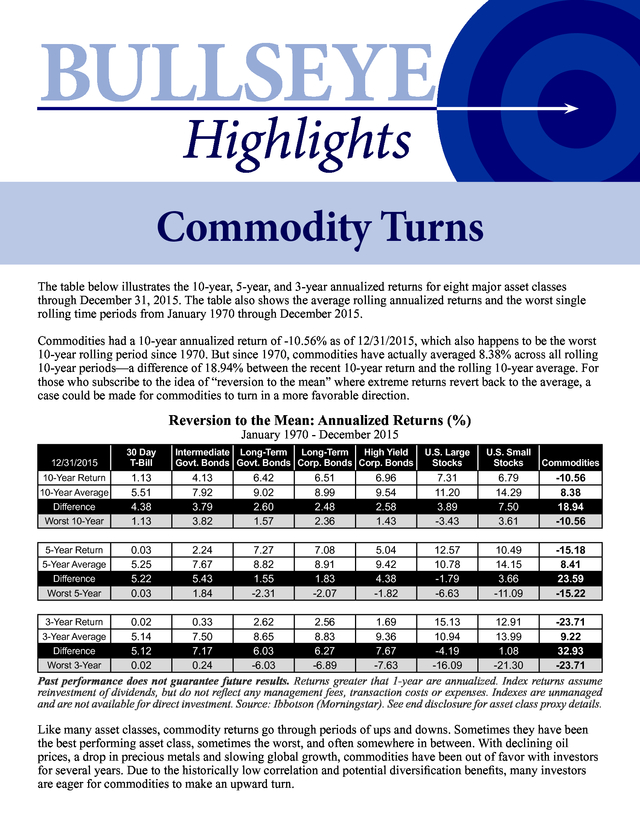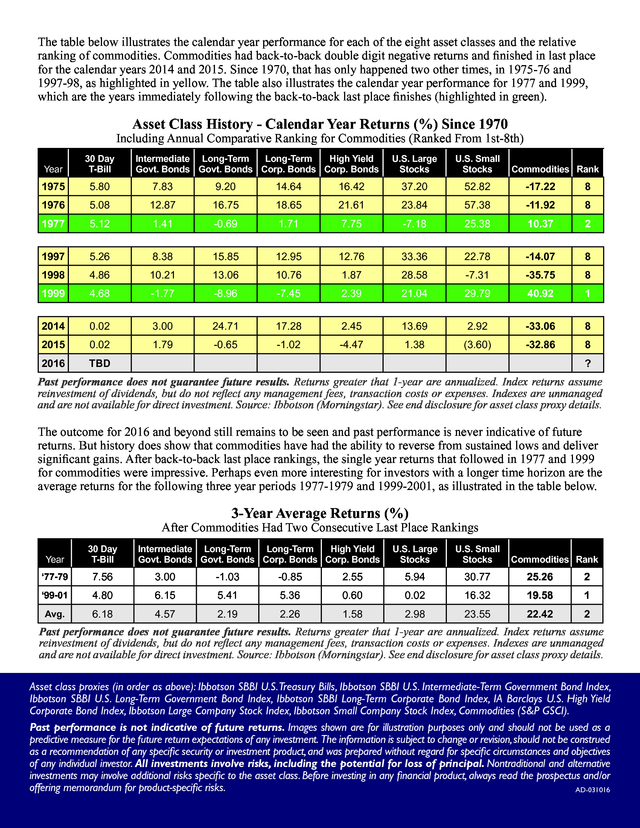Description
Bullseye
Highlights
Commodity Turns
The table below illustrates the 10-year, 5-year, and 3-year annualized returns for eight major asset classes
through December 31, 2015. The table also shows the average rolling annualized returns and the worst single
rolling time periods from January 1970 through December 2015.
Commodities had a 10-year annualized return of -10.56% as of 12/31/2015, which also happens to be the worst
10-year rolling period since 1970. But since 1970, commodities have actually averaged 8.38% across all rolling
10-year periods—a difference of 18.94% between the recent 10-year return and the rolling 10-year average. For
those who subscribe to the idea of “reversion to the mean” where extreme returns revert back to the average, a
case could be made for commodities to turn in a more favorable direction.
Reversion to the Mean: Annualized Returns (%)
January 1970 - December 2015
12/31/2015
10-Year Return
10-Year Average
Difference
Worst 10-Year
5-Year Return
5-Year Average
Difference
Worst 5-Year
3-Year Return
3-Year Average
Difference
Worst 3-Year
30 Day
T-Bill
Intermediate Long-Term Long-Term
High Yield
Govt.
Bonds Govt. Bonds Corp. Bonds Corp.
Bonds U.S. Large Stocks U.S. Small Stocks Commodities 1.13 5.51 4.38 1.13 4.13 7.92 3.79 3.82 6.42 9.02 2.60 1.57 6.51 8.99 2.48 2.36 6.96 9.54 2.58 1.43 7.31 11.20 3.89 -3.43 6.79 14.29 7.50 3.61 -10.56 8.38 18.94 -10.56 0.03 5.25 5.22 0.03 2.24 7.67 5.43 1.84 7.27 8.82 1.55 -2.31 7.08 8.91 1.83 -2.07 5.04 9.42 4.38 -1.82 12.57 10.78 -1.79 -6.63 10.49 14.15 3.66 -11.09 -15.18 8.41 23.59 -15.22 0.02 5.14 5.12 0.02 0.33 7.50 7.17 0.24 2.62 8.65 6.03 -6.03 2.56 8.83 6.27 -6.89 1.69 9.36 7.67 -7.63 15.13 10.94 -4.19 -16.09 12.91 13.99 1.08 -21.30 -23.71 9.22 32.93 -23.71 Past performance does not guarantee future results.
Returns greater that 1-year are annualized. Index returns assume reinvestment of dividends, but do not reflect any management fees, transaction costs or expenses. Indexes are unmanaged and are not available for direct investment.
Source: Ibbotson (Morningstar). See end disclosure for asset class proxy details. Like many asset classes, commodity returns go through periods of ups and downs. Sometimes they have been the best performing asset class, sometimes the worst, and often somewhere in between.
With declining oil prices, a drop in precious metals and slowing global growth, commodities have been out of favor with investors for several years. Due to the historically low correlation and potential diversification benefits, many investors are eager for commodities to make an upward turn. . The table below illustrates the calendar year performance for each of the eight asset classes and the relative ranking of commodities. Commodities had back-to-back double digit negative returns and finished in last place for the calendar years 2014 and 2015. Since 1970, that has only happened two other times, in 1975-76 and 1997-98, as highlighted in yellow. The table also illustrates the calendar year performance for 1977 and 1999, which are the years immediately following the back-to-back last place finishes (highlighted in green). Asset Class History - Calendar Year Returns (%) Since 1970 Including Annual Comparative Ranking for Commodities (Ranked From 1st-8th) Year 30 Day T-Bill Intermediate Long-Term Long-Term High Yield Govt.
Bonds Govt. Bonds Corp. Bonds Corp.
Bonds U.S. Large Stocks U.S. Small Stocks 1975 5.80 7.83 9.20 14.64 16.42 37.20 52.82 -17.22 8 1976 5.08 12.87 16.75 18.65 21.61 23.84 57.38 -11.92 8 1977 5.12 1.41 -0.69 1.71 7.75 -7.18 25.38 10.37 2 1997 5.26 8.38 15.85 12.95 12.76 33.36 22.78 -14.07 8 1998 4.86 10.21 13.06 10.76 1.87 28.58 -7.31 -35.75 8 1999 4.68 -1.77 -8.96 -7.45 2.39 21.04 29.79 40.92 1 2014 0.02 3.00 24.71 17.28 2.45 13.69 2.92 -33.06 8 2015 0.02 1.79 -0.65 -1.02 -4.47 1.38 (3.60) -32.86 8 2016 TBD Commodities Rank ? Past performance does not guarantee future results.
Returns greater that 1-year are annualized. Index returns assume reinvestment of dividends, but do not reflect any management fees, transaction costs or expenses. Indexes are unmanaged and are not available for direct investment.
Source: Ibbotson (Morningstar). See end disclosure for asset class proxy details. The outcome for 2016 and beyond still remains to be seen and past performance is never indicative of future returns. But history does show that commodities have had the ability to reverse from sustained lows and deliver significant gains.
After back-to-back last place rankings, the single year returns that followed in 1977 and 1999 for commodities were impressive. Perhaps even more interesting for investors with a longer time horizon are the average returns for the following three year periods 1977-1979 and 1999-2001, as illustrated in the table below. 3-Year Average Returns (%) After Commodities Had Two Consecutive Last Place Rankings Year 30 Day T-Bill Intermediate Long-Term Long-Term High Yield Govt. Bonds Govt.
Bonds Corp. Bonds Corp. Bonds U.S.
Large Stocks U.S. Small Stocks ‘77-79 7.56 3.00 -1.03 -0.85 2.55 5.94 30.77 25.26 2 ‘99-01 4.80 6.15 5.41 5.36 0.60 0.02 16.32 19.58 1 Avg. 6.18 4.57 2.19 2.26 1.58 2.98 23.55 22.42 2 Commodities Rank Past performance does not guarantee future results. Returns greater that 1-year are annualized.
Index returns assume reinvestment of dividends, but do not reflect any management fees, transaction costs or expenses. Indexes are unmanaged and are not available for direct investment. Source: Ibbotson (Morningstar).
See end disclosure for asset class proxy details. Asset class proxies (in order as above): Ibbotson SBBI U.S. Treasury Bills, Ibbotson SBBI U.S. Intermediate-Term Government Bond Index, Ibbotson SBBI U.S.
Long-Term Government Bond Index, Ibbotson SBBI Long-Term Corporate Bond Index, IA Barclays U.S. High Yield Corporate Bond Index, Ibbotson Large Company Stock Index, Ibbotson Small Company Stock Index, Commodities (S&P GSCI). Past performance is not indicative of future returns. Images shown are for illustration purposes only and should not be used as a predictive measure for the future return expectations of any investment.
The information is subject to change or revision, should not be construed as a recommendation of any specific security or investment product, and was prepared without regard for specific circumstances and objectives of any individual investor. All investments involve risks, including the potential for loss of principal. Nontraditional and alternative investments may involve additional risks specific to the asset class.
Before investing in any financial product, always read the prospectus and/or offering memorandum for product-specific risks. AD-031016 .
Bonds Govt. Bonds Corp. Bonds Corp.
Bonds U.S. Large Stocks U.S. Small Stocks Commodities 1.13 5.51 4.38 1.13 4.13 7.92 3.79 3.82 6.42 9.02 2.60 1.57 6.51 8.99 2.48 2.36 6.96 9.54 2.58 1.43 7.31 11.20 3.89 -3.43 6.79 14.29 7.50 3.61 -10.56 8.38 18.94 -10.56 0.03 5.25 5.22 0.03 2.24 7.67 5.43 1.84 7.27 8.82 1.55 -2.31 7.08 8.91 1.83 -2.07 5.04 9.42 4.38 -1.82 12.57 10.78 -1.79 -6.63 10.49 14.15 3.66 -11.09 -15.18 8.41 23.59 -15.22 0.02 5.14 5.12 0.02 0.33 7.50 7.17 0.24 2.62 8.65 6.03 -6.03 2.56 8.83 6.27 -6.89 1.69 9.36 7.67 -7.63 15.13 10.94 -4.19 -16.09 12.91 13.99 1.08 -21.30 -23.71 9.22 32.93 -23.71 Past performance does not guarantee future results.
Returns greater that 1-year are annualized. Index returns assume reinvestment of dividends, but do not reflect any management fees, transaction costs or expenses. Indexes are unmanaged and are not available for direct investment.
Source: Ibbotson (Morningstar). See end disclosure for asset class proxy details. Like many asset classes, commodity returns go through periods of ups and downs. Sometimes they have been the best performing asset class, sometimes the worst, and often somewhere in between.
With declining oil prices, a drop in precious metals and slowing global growth, commodities have been out of favor with investors for several years. Due to the historically low correlation and potential diversification benefits, many investors are eager for commodities to make an upward turn. . The table below illustrates the calendar year performance for each of the eight asset classes and the relative ranking of commodities. Commodities had back-to-back double digit negative returns and finished in last place for the calendar years 2014 and 2015. Since 1970, that has only happened two other times, in 1975-76 and 1997-98, as highlighted in yellow. The table also illustrates the calendar year performance for 1977 and 1999, which are the years immediately following the back-to-back last place finishes (highlighted in green). Asset Class History - Calendar Year Returns (%) Since 1970 Including Annual Comparative Ranking for Commodities (Ranked From 1st-8th) Year 30 Day T-Bill Intermediate Long-Term Long-Term High Yield Govt.
Bonds Govt. Bonds Corp. Bonds Corp.
Bonds U.S. Large Stocks U.S. Small Stocks 1975 5.80 7.83 9.20 14.64 16.42 37.20 52.82 -17.22 8 1976 5.08 12.87 16.75 18.65 21.61 23.84 57.38 -11.92 8 1977 5.12 1.41 -0.69 1.71 7.75 -7.18 25.38 10.37 2 1997 5.26 8.38 15.85 12.95 12.76 33.36 22.78 -14.07 8 1998 4.86 10.21 13.06 10.76 1.87 28.58 -7.31 -35.75 8 1999 4.68 -1.77 -8.96 -7.45 2.39 21.04 29.79 40.92 1 2014 0.02 3.00 24.71 17.28 2.45 13.69 2.92 -33.06 8 2015 0.02 1.79 -0.65 -1.02 -4.47 1.38 (3.60) -32.86 8 2016 TBD Commodities Rank ? Past performance does not guarantee future results.
Returns greater that 1-year are annualized. Index returns assume reinvestment of dividends, but do not reflect any management fees, transaction costs or expenses. Indexes are unmanaged and are not available for direct investment.
Source: Ibbotson (Morningstar). See end disclosure for asset class proxy details. The outcome for 2016 and beyond still remains to be seen and past performance is never indicative of future returns. But history does show that commodities have had the ability to reverse from sustained lows and deliver significant gains.
After back-to-back last place rankings, the single year returns that followed in 1977 and 1999 for commodities were impressive. Perhaps even more interesting for investors with a longer time horizon are the average returns for the following three year periods 1977-1979 and 1999-2001, as illustrated in the table below. 3-Year Average Returns (%) After Commodities Had Two Consecutive Last Place Rankings Year 30 Day T-Bill Intermediate Long-Term Long-Term High Yield Govt. Bonds Govt.
Bonds Corp. Bonds Corp. Bonds U.S.
Large Stocks U.S. Small Stocks ‘77-79 7.56 3.00 -1.03 -0.85 2.55 5.94 30.77 25.26 2 ‘99-01 4.80 6.15 5.41 5.36 0.60 0.02 16.32 19.58 1 Avg. 6.18 4.57 2.19 2.26 1.58 2.98 23.55 22.42 2 Commodities Rank Past performance does not guarantee future results. Returns greater that 1-year are annualized.
Index returns assume reinvestment of dividends, but do not reflect any management fees, transaction costs or expenses. Indexes are unmanaged and are not available for direct investment. Source: Ibbotson (Morningstar).
See end disclosure for asset class proxy details. Asset class proxies (in order as above): Ibbotson SBBI U.S. Treasury Bills, Ibbotson SBBI U.S. Intermediate-Term Government Bond Index, Ibbotson SBBI U.S.
Long-Term Government Bond Index, Ibbotson SBBI Long-Term Corporate Bond Index, IA Barclays U.S. High Yield Corporate Bond Index, Ibbotson Large Company Stock Index, Ibbotson Small Company Stock Index, Commodities (S&P GSCI). Past performance is not indicative of future returns. Images shown are for illustration purposes only and should not be used as a predictive measure for the future return expectations of any investment.
The information is subject to change or revision, should not be construed as a recommendation of any specific security or investment product, and was prepared without regard for specific circumstances and objectives of any individual investor. All investments involve risks, including the potential for loss of principal. Nontraditional and alternative investments may involve additional risks specific to the asset class.
Before investing in any financial product, always read the prospectus and/or offering memorandum for product-specific risks. AD-031016 .













